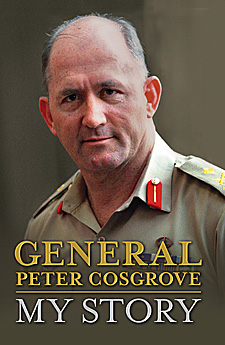Australia's intervention in East Timor in 1999 was a major turning point in the public perception of the military since WWII. If Vietnam was the lowest ebb, the success of East Timor became the occasion when Australians could once again be openly proud of the achievements of our military.
The Commander of INTERFET (International Force in East Timor), General Peter Cosgrove, became the face and voice of that new prominence; this boy from Paddington became "Our General', and he was a popular choice as the Australian of the Year for 2001.
His autobiography, simply titled My Story, gives the readers an insight, not just into Peter Cosgrove, the man, but also into the mind of a military commander. The book is sprinkled with amusing and sometimes outrageous stories and anecdotes. As I read the book, I almost felt as if I was sitting around in an Army Mess somewhere, listening to a big, very likable man telling his stories of adventure.
 I was taken by his use of the word "luck' in My Story.
I was taken by his use of the word "luck' in My Story.
He uses the word in reference to various successes and safe returns from operations and deployments and also in relationship to his promotions through the ranks. I noticed that the General actually uses the word with a sense of awe, humility and thankfulness.
For Cosgrove, "luck' is no random collection of coincidences that will win a card game, but it is very much an expression of God's providence. Maybe we are seeing here something of his earlier education by the Christian Brothers at Waverly College.
Peter Cosgrove has been criticized by some people for being "too close' to the Prime Minister, Mr. Howard. It is interesting to read that he felt quite hurt by some of the criticisms that were leveled at him. Some readers might remember the Cosgrove versus Mick Keelty (AFP Chief) clash, as well as the Parliamentary enquiry into Military Justice.
In his discussion of those issues, we gain an insight into Peter Cosgrove's deeply held convictions about the function and place of the military in a democracy. We also realize that at the heart of this military commander is an amazing sense of personal responsibility towards the men and women he led especially in the way he speaks of "my military children'.
One inherent problem of any autobiography is that we gain only a one dimensional view into the person; after all it is a view from the inside! My Story certainly does suffer from this problem of one dimensionality.
That said, I found the book has given me a useful insight into the history of what was really happening behind the news during Peter Cosgrove's time as military commander. It has also given me a new perspective in understanding some of the current issues, such as the enquiry into Private Kovco's death and accusations of Australia's new colonialism in the South Pacific with our current and possible future deployments into those nations.
While watching the television news recently, I saw the evident strain on the face of the present CDF, Air Chief Marshall Angus Houston as he discussed the latest ADF loss of life. Because of My Story I now have a greater appreciation of the inner feelings and turmoil of senior military leadership.






















